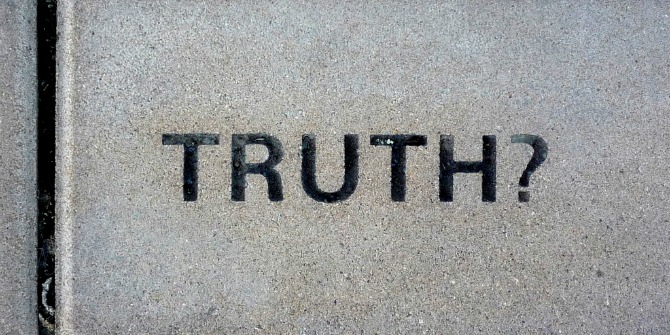
 The relationship between disinformation and political propaganda is often a hazy and complex one. Here, JM Lanuza, Assistant Professor of Political Science at the University of the Philippines, and Jonathan Corpus Ong, Associate Professor of Global Digital Media, University of Massachusetts, provide some insight based on their research into digital disinformation in the 2019 Philippine midterm election.
The relationship between disinformation and political propaganda is often a hazy and complex one. Here, JM Lanuza, Assistant Professor of Political Science at the University of the Philippines, and Jonathan Corpus Ong, Associate Professor of Global Digital Media, University of Massachusetts, provide some insight based on their research into digital disinformation in the 2019 Philippine midterm election.
Flat Earthers believe in a conspiracy that experts suppress the truth of a flat earth. In the Philippines, this fringe community sneaked into mainstream public conversation last April, when a veteran journalist endorsed the Flat Earth Philippines’ Twitter page and cited ancient scripture as basis for the claim that the earth is flat.
Is there more to this fringe community that challenges established scientific facts? Does their growing network have anything to do with the rise of disinformation in the Philippines?
In our research on digital disinformation in the 2019 Philippine midterm election, we took a deep dive into Filipino Flat Earth groups on social media. We find its momentum to be turbocharged by the current wave of attacks and mistrust against “experts” like journalists, scientists, and academics. We also observed that the group administrators and active posters are part of disinformation networks who seed political content in between flat earth discussions to tarnish the reputation of candidates running against populist President Rodrigo Duterte’s senatorial slate.
Our research team followed Filipino flat earth accounts and groups across Twitter, Facebook, and YouTube to observe their information sharing and conversation patterns. Here’s what we found.
Religious foundations, technological reinforcements
Filipino Flat Earthers have similar characteristics to fundamentalist Christian flat earthers in the United States, where flat earth conventions are reported to involve people praying over one another and swapping Bible verses. In the Philippines, the official description of one group referenced Romans 1:18, which describes a vengeful Old Testament God who will reveal himself against “those suppressing the truth”. Other posters explicitly identified themselves as “Christian Flat Earthers” and often ended their posts with “Glory to God”.
This subculture marries belief in anti-government conspiracy theories such as distrust in NASA scientists in the US or the mainstream media outlets in the Philippines with self-reinforced biblical literalism, using bible verses as proof for flat Earth.
Sustaining these beliefs are YouTube clips that further draw people in their conspiratorial beliefs. An experiment with a new YouTube account showed that viewing one video shortly led to all twelve of the recommended videos on our homepage having more flat earth content. Both the recommendation algorithm and the auto-play function of YouTube create the perfect binge watch conditions that reinforce conspiratorial beliefs.
Community formation
Beyond exchanging conspiracy videos, Filipino Flat Earth Facebook groups build communities among their members. Exchanging stories of perceived victimhood is not only therapeutic; it also consolidates members around an ‘us-versus-them’ group identity.
Members support each other when they are hurt or humiliated for believing in conspiracies, by offering consolation or defending their peers through coordinated and simultaneous posting and commenting, mobilizing themselves as “keyboard warriors”.
Seeding political messages
The Filipino Flat Earth groups have become a petri dish of political fake news and campaign propaganda for the 2019 elections. We observed that active posters of Filipino Flat Earth Facebook groups seeded content favorable to President Duterte and his allies.
For example, one user gratefully shared a video of Duterte from the official Presidential Communications Operations Office page for promoting tourism in the country. Another shared a false news report that praised Duterte’s anti-corruption drive involving Duterte kicking the World Bank and IMF out of the country.
Admins also behave in suspicious ways similar to disinformation architects we have previously studied. They consistently and systematically shared posts critical of politicians running against President Duterte’s party. In one instance, the admin quickly attempted to silence a member arguing for flaws in Duterte’s candidates.
The Facebook profiles of several admins and active posters of Filipino flat earth groups were also suspicious: nicknames rather than full names, scant personal information, invisible friends’ lists, and use of generic profile pictures like animals, inspirational quotes, or pictures of sexy women with large sunglasses. The Facebook pages these admins follow included pro-government fan pages and Facebook groups of ‘influencers’ infamous for spreading fake news favorable to President Duterte.
Beware of social media manipulation
We don’t think it’s a mere coincidence that flat earth conspiracy has hijacked attention in the middle of a heated election season. With distrust against the scientific and media establishment, flat earthers are vulnerable into being organized to support personalities that challenge the political establishment.
While we don’t discount that most of the members of the Facebook group are real, the behaviors of the Filipino flat earth group admins are suspicious in their anonymity and organized seeding of political messages. In this fractious political environment, online bad actors seek to weaponize organic communities to serve the nefarious ambitions of their political clients.
Read the full report here: Tracking Digital Disinformation in the 2019 Philippine Midterm Election
This article represents the views of the authors, and not the position of the LSE Media Policy Project, nor of the London School of Economics and Political Science.





